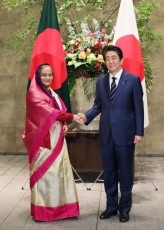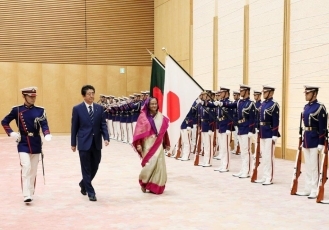Japan-Bangladesh Relations
Japan-Bangladesh Summit Meeting
 Prime Minister welcoming
Prime Minister welcomingthe Prime Minister of Bangladesh (Photo: Cabinet Public Relations Office)
 Salute and guard of honor ceremony
(Photo: Cabinet Public Relations Office)
Salute and guard of honor ceremony
(Photo: Cabinet Public Relations Office)
 Japan-Bangladesh Summit Meeting
(Photo: Cabinet Public Relations Office)
Japan-Bangladesh Summit Meeting
(Photo: Cabinet Public Relations Office)
On May 29, from at 6:00 p.m. for approximately 50 minutes, Mr. Shinzo Abe, Prime Minister of Japan, held a Japan-Bangladesh Summit Meeting with H. E. Sheikh Hasina, Prime Minister of the People's Republic of Bangladesh on the occasion of her visit to Japan. The overview of the meeting is as follows. (Mr. Taro Aso, Deputy Prime Minister and Minister of Finance and Mr. Taro Kono, Minister for Foreign Affairs attended the meeting from Japan side, Mr. A H M Mustafa Kamal, Minister of Finance and others from Bangladesh side also attended the meeting). Following the meeting, the two leaders held a joint press conference, after which Prime Minister Abe hosted a banquet for Prime Minister Hasina. The Fact Sheet about Comprehensive Partnership between Japan and the People’s Republic of Bangladesh (PDF) was issued.
was issued.
1. Opening Remarks
(1) Prime Minister Abe congratulated Prime Minister Hasina on her reappointment as Prime Minister and welcomed her visit to Japan. He stated that Japan highly appreciated the efforts being made by the Government of Bangladesh, under the leadership of Prime Minister Hasina, to generously accept and shelter so many displaced persons from Myanmar.
(2) In response, Prime Minister Hasina stated that Japan is a long-standing friend of Bangladesh and that she is delighted to come back to Japan and be reunited with Prime Minister Abe. She offered her congratulations on the beginning of the Reiwa era and expressed deep appreciation for Japan’s contributions to the development of Bangladesh to date.
2. Bilateral Relations
(1) Prime Minister Abe stated that under the leadership of Prime Minister Hasina Bangladesh has achieved high economic growth, and that the nation’s development is something that will contribute not only to the prosperity of the people of Bangladesh, but to the stability of the Indo-Pacific region as a whole. He also stated that Japan seeks to further advance the Japan-Bangladesh Comprehensive Partnership. Prime Minister Abe also stated that Japan wishes to cooperate towards the realization of a “free and open Indo-Pacific,” and that in the field of maritime security he will continue port visits to Bangladesh by vessels and aircraft of the Japan Self-Defense Forces and further invigorate exchanges between both countries’ Coast Guard authorities. In the economic areas, Prime Minister Abe stated that Japan will continue to provide support Bangladesh to advance towards the achievement of the Sustainable Development Goals (SDGs) and to become a middle income country by 2021. He also expressed the expectation that the Bay of Bengal Industrial Growth Belt (BIG-B) initiative would result in the enhancement of connectivity through high-quality infrastructure and that trade and investment would be further promoted through the entry of Japanese companies. He also requested continuing cooperation to ensure the safety of Japanese nationals and Japanese companies based in Bangladesh.
(2) Prime Minister Hasina welcomed Japan’s participation in initiatives to develop the South Chittagong region and expressed her expectation that more Japanese companies will enter business markets in Bangladesh, through such opportunities as discussions in the Japan-Bangladesh Public Private Joint Economic Dialogue (PPED). Prime Minister Hasina also extended her gratitude for the signing and exchange of notes during her current visit to Japan relating to the provision of yen loans to support such projects as the development of Matarbari Port and the construction of Dhaka MRT Line 1. She also stated that Bangladesh will continue to implement security measures for Japanese nationals and Japanese companies based in Bangladesh.
(3) Both leaders reiterated their commitment that efforts will be made to expand people-to-people exchanges in various fields, including through the utilization of Japan’s new resident status “specified skilled workers” and the milestone 50th anniversary of the establishment of diplomatic relations between Japan and Bangladesh in 2022.
3. United Nations
Prime Minister Hasina expressed Bangladesh’s support for Japan’s aspiration to become a permanent member of the United Nations Security Council (UNSC) and for Japan’s candidature for the UNSC non-permanent membership election in 2022, to which Prime Minister Abe expressed his appreciation.
4. Regional Situation
(1) Prime Minister Abe expressed concern about the prolonged issue of displaced persons from Myanmar, and after commenting on the importance of creating an environment conductive in Myanmar with a view to realizing the early repatriation of the displaced persons in a safe, voluntary and dignified manner, he stated that Japan will continue to provide assistance for the efforts of Bangladesh to relieve the burden on host communities. Prime Minister Hasina stressed the need of measures to be taken by the Government of Myanmar to create an environment conducive for return of the displaced persons.
(2) Both leaders reaffirmed that they would work to fully implement all relevant UNSC resolutions towards the denuclearization of North Korea and cooperate to achieve the early resolution of the abduction issue.
